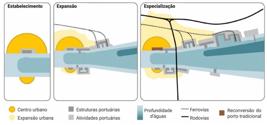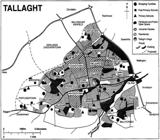Abstract
From a functional point of view, port and city create a set of interactions and complementarities change over time under the influence of economic, productive, technological and social dynamics. Considering these variables, analytical models point to the occurrence of common and recurring phases in port cities around the world. From this standpoint, the present study seeks to reveal how the mutations in the functional relations between the city and the port activity, in conjunction with the productive arrangements, influenced the urban-territorial configuration. For this, a reading of the urban form of Dublin, capital of Ireland, was performed, regarding the design of its occupation over the territory along a time line. In this study, the port is considered to be key equipment for changes in the shape of the city because it is directly associated with changes in the local and global productive and economic process. When establishing a parallel between the port activity and the urban form, it was concluded that the different stages of approach and mainly the distance between the city and the port activity created centralities, dispersion and obsolescence in the urban fabric, corroborating the formation of new territorial organizations.
Keywords:
Urban form; Model of urban expansion; Port city; Conceptual model; Dublin

 Thumbnail
Thumbnail
 Thumbnail
Thumbnail
 Thumbnail
Thumbnail
 Thumbnail
Thumbnail
 Thumbnail
Thumbnail
 Thumbnail
Thumbnail
 Thumbnail
Thumbnail
 Thumbnail
Thumbnail
 Thumbnail
Thumbnail
 Thumbnail
Thumbnail
 Thumbnail
Thumbnail
 Thumbnail
Thumbnail











